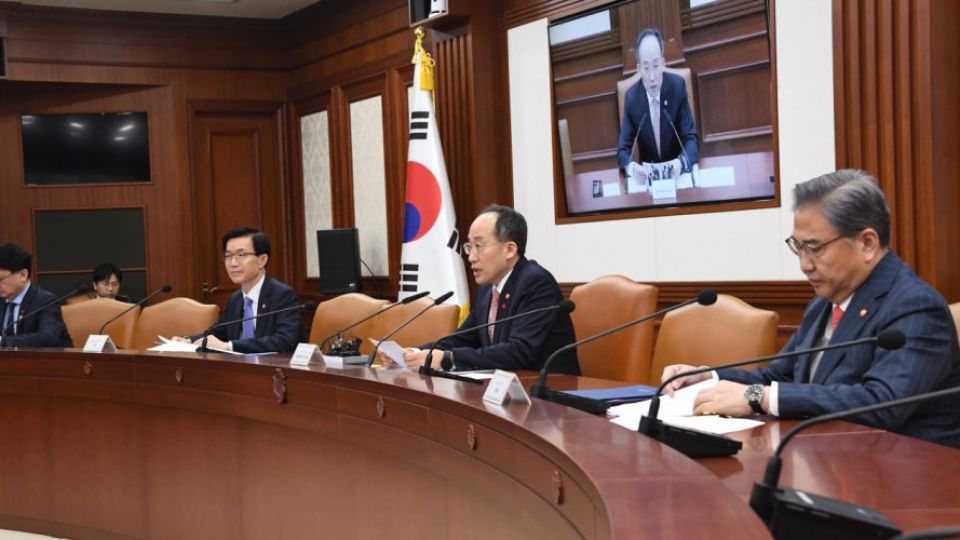December 12, 2023
SEOUL – The government said Monday it would establish a commission to coordinate and oversee the country’s policies on critical industrial supply chains by June next year.
Together with the Ministry of Foreign Affairs, the Korea Customs Service and the Public Procurement Service, authorities will work to identify risks to supply chains that are highly dependent on specific countries.
Each related ministry will operate a supply chain early warning system for materials essential to economic activities — such as urea and graphite — in order to cope with possible supply crunches.
Ministers agreed to form a fund via the state-run Export-Import Bank of Korea to secure stockpiles of critical supplies and support investment in relevant businesses and facilities. The size of the fund is expected to exceed 5 trillion won ($3.79 billion).
The government held its first ministerial-level meeting on the matter Monday, presided over by Finance Minister Choo Kyung-ho, to discuss the details of measures designed to hedge against risks.
“Recently, supply chain risk factors for items directly related to core industries and people’s livelihoods — such as urea, diammonium phosphate and graphite — are increasing,” Choo said during the meeting.
His remarks came amid growing concern over Chinese export curbs on materials that could take a toll on Korean companies. The latest move appears to be another export control on ammonium phosphate, a raw material for chemical fertilizers, in addition to suspending urea exports to Korean firms.
He said the government’s ability to respond to supply chain risks will be strengthened by mapping out plans to support the enforcement of the Supply Chain Stabilization Act, which the National Assembly passed last week. The act stipulates the establishment of a commission for deliberating and adjusting relevant plans along with the operation of an early warning system. It will come into effect in June next year.
According to the Ministry of Economy and Finance, the government-wide commission, which will deliberate and coordinate supply chain stabilization and crisis response policies will be established by the end of June 2024.
Chaired by the finance minister, it will comprise 25 people, including external experts in the economic and security sectors.
The commission will finalize the basic plan for supply chain stabilization policy and supportive measures in the second half of next year. Based on the scheme, the relevant ministries will establish annual implementation plans by January 2025.
The commission will designate materials and items for intensive monitoring, choosing them from some 200 the government selected in 2021. Magnesium, tungsten, neodymium and lithium hydroxide were included in the previous listing.
As well as securing key supplies, the Eximbank supply chain stabilization fund will support loans, guarantees and investments by supply chain operators.
The plan includes the establishment of a dedicated organization at bank after receiving National Assembly guarantee approval in the first quarter of next year. A fund deliberation committee is expected to be formed in the first half of next year and begin full-scale operation in the second half.
Meanwhile, the government said Monday that the prices and inventories of urea solution, used to reduce emissions in diesel vehicles, remained similar to previous levels despite China’s export controls.
According to the Finance Ministry, the price of urea solution sold at gas stations as of Dec. 7 was 1,602 won ($1.21) per liter, similar to the previous day’s 1,599 won. The usual price of urea solution is between 1,300 won and 1,800 won.
It also said that the country had secured enough urea for 4.3 months as of Dec. 8.
In preparation for the increase in imports of finished urea products, the government is also preparing a rapid inspection system for test pass certificates that will shorten the period from application to issuance from the existing 20 days to 5 days.
To diversify imports, tariff quotas will be applied to vehicle components from countries such as Indonesia and Saudi Arabia, and maritime transportation costs for industrial and vehicle components will also be partially supported until April next year.
Starting January, the government will conduct a feasibility study to domestically produce and build urea production facilities.
In the case of graphite, for which the Chinese government began controlling exports on Dec. 1, the country holds inventory sufficient for three to five months.
China is the world’s top producer of graphite, the key raw material for secondary batteries. South Korea relies on China for more than 90 percent of its graphite needs.


